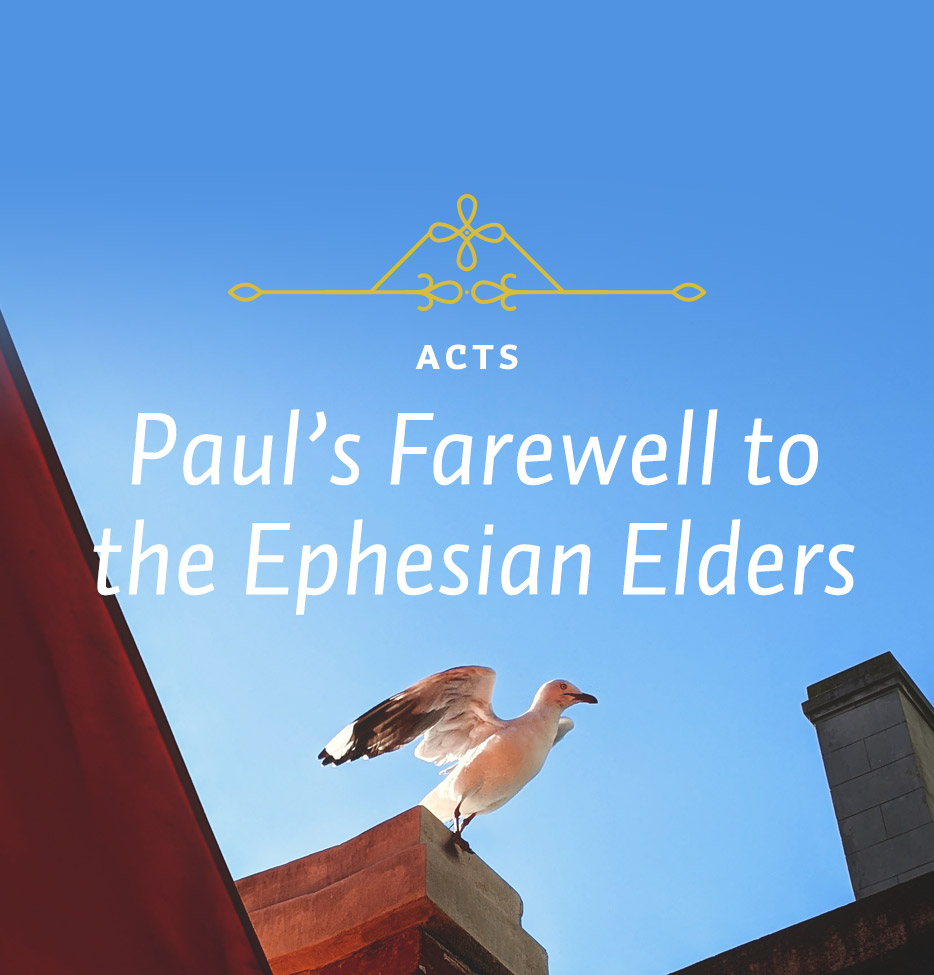The second part of Acts 20:13-38 is Paul’s charge to the elders. It is in verses 25-31. He puts it in different ways, but when we analyze what he is saying it boils down to one thing: “Keep watch over the flock within your charge.” He says, “Be diligent,” “Watch out for enemies,” “Take heed of wolves.” But basically he is telling them: “Keep watch over yourselves and all the flock of which the Holy Spirit has made you overseers” (v. 28).
It is interesting that the word Paul uses for the elders in this verse is not the word “elder” (Greek, presbyteros), which literally means “older ones,” though it occurs in verse 17, but “overseer” (Greek, episkopos). Episkopos is an interesting word. For one thing, it has given us our word “bishop.” What is a bishop? A bishop is “an overseer.” Here, of course, Paul is not using the word in an ecclesiastical sense to describe a certain order of clergy, even less of a person who is singularly responsible for a certain segment of the church. Rather, he is speaking of all the elders of a local church as overseers, that is, as those who have a responsibility for the oversight of Christians in their area.
“Overseer” is exactly what the Greek word episkopos means, of course. That is the other interesting thing about it. It is composed of two parts: skopos, which is from the verb skopio (meaning “to look”) and epi (meaning “over”). So an episkopos is literally “one who looks over” or “keeps watch over” someone else. Paul is saying, “If you are overseers, people who have been elected to this responsible position in the church, then make sure you do the job for which you’ve been elected.” He spells it out.
The first thing they are to keep watch over is themselves. They are to keep their lives upright. They are to keep their relationships to God strong.
Second, and having done that, they are to look out for the flock. The image of a flock and its shepherd is not frequent in Paul’s writings, but it is a strong image in the Old Testament since it was written to people whose lives were mostly pastoral. It was also important in the teaching of Jesus Christ. Jesus spoke about Himself as the Shepherd, saying, “I am the good shepherd. The good shepherd lays down his life for the sheep” (John 10:11). So although the image is not frequently used by Paul, when he does use it, as here, he is telling the leaders of the church to imitate Jesus. Their task was to take care of the sheep—not to let them wander away, but to watch out for their health, defend them from enemies, and such things. The reason they were to do this is that the flock was not their flock but God’s. It is a flock Jesus purchased with His blood.
The elders were to be overseers so that no one without and no one within would damage the flock for which Jesus died.
The third part of Paul’s farewell to the Ephesian elders is his prayer for them. We do not have it in so many words. We are only told that when he had given them his charge, “he knelt down with all of them and prayed” (v. 36). On the other hand, I suspect that if we look back carefully over the preceding paragraph, probably we have the gist of what he prayed. This is because in verse 32, which introduces part of the charge, Paul says, “Now I commit you to God and to the word of his grace.”
How did he do that? No doubt, by praying for them. He would say, “Almighty God, I commit into your care these men who are the leaders of the church in Ephesus. Keep them by the power of your Holy Spirit and by the Scriptures, by which alone you speak to the church and through which you have chosen to operate. Keep them from danger. Preserve this church from evil within and without. Grant that it might be strong. Fill it with people who know your Word and, because they know your Word, live in close fellowship with you. Let them grow in grace and thus, instead of succumbing to the temptations of the world, become strong in the knowledge of who you are—your person, your will, your ways— and by the Holy Spirit determine to obey you and walk after you.”
Do you think God heard this prayer? I do. I think God heard it and answered it, because the church in Ephesus was strong and survived to be an effective witness in Asia for many years.






